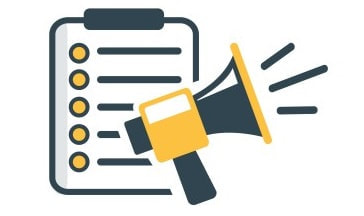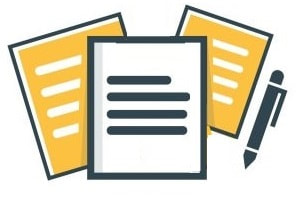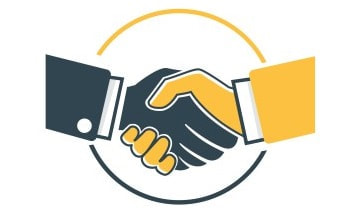Common Interview Questions - Prepare with Confidence
Arrive fully prepared and ready to shine by using our 15+ most common interview questions and our advice on how to answer them
Updated 14 October 2023
Interviews can be the most intimidating part of a job application for many, but with a little forethought and preparation, you should be able to present yourself well and make an impact. Our guide covers everything you need to know to prepare with confidence:
Know this first: Preparation is meaningless if you're not on time. Lateness is always one of the top reasons for rejection per recruiters we spoke to as we researched this guide. For this reason, it's essential to get there early and have a few minutes to relax and compose yourself before you go in. Aside from being prepared for interview questions, you'll need to dress appropriately, look enthusiastic and act confident.
Top Tip: Visit Glassdoor to read up about the experiences from people who have interviewed at the company. This information is useful, and while it can't be verified, it does help plan for your visit. You can also read the reviews of the company to see what employees (past and current) are saying about the company and its management.
See the interview as a conversation. The interviewer is not there to catch you out. If you have been invited to an interview, they are already interested, and you have already impressed them. Remember that they need to impress you too, there have been plenty of people who decide to turn down a job because the interviewer made a bad impression on them.
- 15 of the Most Common Interview Questions to Help You Prepare
- Three Job Interview Preparation Steps
- Five Must-Know Job Interview Facts
Know this first: Preparation is meaningless if you're not on time. Lateness is always one of the top reasons for rejection per recruiters we spoke to as we researched this guide. For this reason, it's essential to get there early and have a few minutes to relax and compose yourself before you go in. Aside from being prepared for interview questions, you'll need to dress appropriately, look enthusiastic and act confident.
Top Tip: Visit Glassdoor to read up about the experiences from people who have interviewed at the company. This information is useful, and while it can't be verified, it does help plan for your visit. You can also read the reviews of the company to see what employees (past and current) are saying about the company and its management.
See the interview as a conversation. The interviewer is not there to catch you out. If you have been invited to an interview, they are already interested, and you have already impressed them. Remember that they need to impress you too, there have been plenty of people who decide to turn down a job because the interviewer made a bad impression on them.
15+ of the Most Common Interview Questions to Help You Prepare
Our list below covers the essentials for any interview preparation.
1. Tell me about yourself
The first question is likely to be "Tell us about yourself". This invites a summary of your educational background and work experience to date. To deliver the best answer:
- Try to keep it aligned with the job description and show how you are the kind of person they need. It is about you, the worker, rather than you the person.
- You should also include some information about your interests and pastimes outside of work. Consider what they convey about you too. If you are in a club or team, that indicates commitment, effort and teamwork. Saying you're a fruitarian anti-GM activist, on the other hand, might provoke a mixed response. Try to avoid waffling and digressions.
2. What do you know about the organisation?
What matters here is the basics - you don't need to be an expert, but knowing more than a one-liner is essential. An employer will expect you to know about:
To answer effectively, you need to talk about the business, the sector/industry in general (key challengers, major competitors, innovation etc) - the more enthusiastic and insightful you are, the better the result you can expect. If you don't have knowledge of the business and industry, you're less useful to the company.
Contracting? If you are being hired for a specific project, it's also good to research the organisation and relate it to your previous experience.
- What they do
- The products and services they offer
- Why the company is different to its competitors
To answer effectively, you need to talk about the business, the sector/industry in general (key challengers, major competitors, innovation etc) - the more enthusiastic and insightful you are, the better the result you can expect. If you don't have knowledge of the business and industry, you're less useful to the company.
Contracting? If you are being hired for a specific project, it's also good to research the organisation and relate it to your previous experience.
3. Why do you want to work for us?
Each applicant has a different reason, but the employer asks this to understand your motivations - to succeed you must be authentic and focus on the employer's needs. Your wants are secondary. To best answer this question:
- Demonstrate your knowledge of the company by highlighting something about the job that stands out and interests you. For example, it can be the clients they work with, the new products they've released, the work they do in a particular community, etc.
- You can also talk about the management of the company - websites like Glassdoor have a lot of information about a company's culture, which is useful to build out your understanding.
- The focus is always on the employer's needs, but you can mention your personal motivations. For example, your belief that the company offers enormous opportunities for building a long-term career.
- Whatever your answer, it must be natural and convey genuine excitement. Being prepared shows the interviewer you care about the company because you've put in the effort.
4. What can you bring to the organisation?
When you're asked this question, you're really being asked why the company should offer you the job. To answer this, you must tie-in your experience with the skills and competencies demanded by the company. The job advert will mention skills and experience, so this is your opportunity to relate these back to you. Specifically:
- Itemise your work history (and education, if applicable). For each skill, explain how you learned that skill and how using it has benefited your current or previous employer. By connecting skills to benefits for the company, you are selling your skills to advantage the company.
- Beyond skills, you can also describe how you work, your passion for the industry, your focus on delivering results (i.e. higher sales, cost savings and/or quality improvements), as well as why your experience is unique and how it can help the company.
5. What are your weaknesses?
It is also highly likely that you will be asked what your strengths and weaknesses are.
"What your weaknesses are" is a question that is worth spending the time to come up with a good answer. "My perfectionism" or anything similarly cringy just won't do. To best answer the question:
"What your weaknesses are" is a question that is worth spending the time to come up with a good answer. "My perfectionism" or anything similarly cringy just won't do. To best answer the question:
- Take another look at the job description, aim for something that is not critical to the job, and frame it positively.
- For instance, you could say that you've always found public speaking a bit nerve-wracking, but you recently took a course on presentation skills that has boosted your confidence.
- This question can be an excellent opportunity to highlight your ongoing learning and development, which employers value.
6. What are your strengths?
Employers want to hire people who are relevant to the business and bring the right experience and skills. The skills listed in the job advert indicate what the employer is looking for. Your answer should include three strengths. To prepare for this question:
- Memorise the top three skills and competencies the employer is looking for. You then have to relate these to your experience and skills.
- Describe each strength separately; demonstrate it with an example which relates to your current or previous employer. For example, “I have exceed sales targets every month, which I believe is due to my strengths in prioritisation and persuasiveness.”
7. Why is there a gap in your work history?
This is an important question for people who have a gap in their CV. Some cases might be straightforward – you took some time off to have kids, recovered from an accident, or because a family member required full-time care for some period. A redundancy due to the impact of COVID-19 is unlikely to be seen as raising any issues.
Having a strong response to explain other cases, such as a period of inability to work due to health issues or getting laid off by a company that was not having financial problems, is essential. You should be ready to set out a persuasive argument that the problem is over and will not have any effect on your future work. This can be tricky to explain without emotion, so preparation is essential. If you have a chronic health condition, you can describe it and state why it will not affect your ability to work.
Having a strong response to explain other cases, such as a period of inability to work due to health issues or getting laid off by a company that was not having financial problems, is essential. You should be ready to set out a persuasive argument that the problem is over and will not have any effect on your future work. This can be tricky to explain without emotion, so preparation is essential. If you have a chronic health condition, you can describe it and state why it will not affect your ability to work.
8. Tell me an achievement you are proud of
This question is designed to highlight what you consider to be important and who are you as an employee and person. Employers are hiring personalities to work in a role, so it's important that the person is well-rounded and resilient. This is not the time to point out an exam result or standard work achievements. Instead, it's an opportunity to talk about your aspirations and values. Good examples include:
Important: Work-based achievements can still be mentioned if they are specifically relevant to the job you're applying for. The best workplace achievement is one that you link directly to a benefit for your employer. For example, you won a new client which lead to a revenue jump of around $500,000 per year.
Additional resource: TheInterviewGuys.com
- Learning a new language or musical instrument
- Taking part in a challenge such as the Tongariro Crossing or other outdoors event such as the Auckland Marathon
- Raising money for a good cause
- Entrepreneurial achievements that might be relevant to the position
- With regards to your previous employment, you can mention completing a project that saved the company money, a change in processes that made the work of a specific department easier etc.
- Whatever you mention, be sure to explain why it's an important achievement for you.
Important: Work-based achievements can still be mentioned if they are specifically relevant to the job you're applying for. The best workplace achievement is one that you link directly to a benefit for your employer. For example, you won a new client which lead to a revenue jump of around $500,000 per year.
Additional resource: TheInterviewGuys.com
9. Why should we hire you?
The employer is only focused on "you". To answer this, you'll need to focus on what makes you valuable to the business, and what motivates you. You will need to draw on your 'unique selling points' and pitch these to the interviewer succinctly. For example:
- You're trained and experienced in a specific software, tool or trade
- You're on a fast-track to manager or director at your current company
- You've been given more responsibility at every performance review
- You have relevant qualifications which will benefit the company (you'll need to mention what these are)
10. What can you offer that other candidates can’t?
This question is asked to understand your character and observe how you talk about yourself and others. To answer the question, the best starting point is to make a list of your strengths - i.e. technical and company experience. You can support these with numbers (i.e. the years of experience you have, the budget sizes you've been responsible for, how many people have reported to you etc).
If you are unsure about how to answer this, which is common for those applying for their first full-time job etc, you can think of a time when you've exceeded expectations and outline that situation.
If you are unsure about how to answer this, which is common for those applying for their first full-time job etc, you can think of a time when you've exceeded expectations and outline that situation.
11. Where do you see yourself in five years?
Researching the company can help you answer the question of "Where do you see yourself in five years?" To answer with substance:
- Try to apply your career plans to the opportunities the role is likely to provide. The interviewer is looking for your understanding and interest in your chosen field.
- They are also getting an idea of whether they can count on you long-term, or whether you'll be moving on in a year.
- Depending on what you do, good answers may involve increasing your expertise in your field, or moving into a leadership role.
12. What would you do in the first two weeks in the job?
This is less common, but it can come up, so it's worth preparing just in case you're asked. In a nutshell, the employer wants to know what you would like to achieve and how you would contribute to the company. If you're serious about the job, answering it will come naturally.
To answer effectively, you need to understand the nature of the work you'll be doing and go above and beyond the standard tasks. A good response includes answers such as:
To answer effectively, you need to understand the nature of the work you'll be doing and go above and beyond the standard tasks. A good response includes answers such as:
- Make notes and fully document existing processes so that I can let co-workers focus on their work and not distract them unwillingly
- Familiarise myself with the team, clients and five priorities of the business unit/department/division I'm working in.
- Learn systems and upskill to ensure I can hit the ground running, mentioning that instructional videos on YouTube for outlining how specific software works has proved invaluable in the past.
13. What kind of working environment do you like best?
The employer wants to know if you would fit with their organisational culture and working conditions. The best way to answer the question is to do your research on the company and be honest about whether or not the working style is one you can adapt to. Glassdoor gives some indication about a workplace's culture and environment, which may be positive or negative (or both). You can also get an insight by looking at the company's website, social media profiles and LinkedIn profiles of current management and employees. Videos about the company also illustrate the culture.
Having researched the company, if you think you can happily work alongside existing team members, explain how your personality matches with the employer’s culture.
Having researched the company, if you think you can happily work alongside existing team members, explain how your personality matches with the employer’s culture.
14. What motivates you?
This is arguably one of the most important questions. Without motivation there's no enthusiasm, which means job performance and innovation can dwindle. The best way to convince the employer that you have motivation is to give examples where you've delivered results to a company because of your enthusiasm and follow-through. For example, this could be a story about how sales targets motivate you to close deal after deal. You can also talk about your passion for the industry and how it keeps evolving, the opportunities to outperform competitors and win new work.
15. What are your salary expectations?
Research is also essential to answering the "What is your salary expectation?" question. Online guides and recruiters can help you find typical salary ranges for the job you have applied for, and you can say "I did some research and found that comparable roles are offering from $(amount) to $(amount). My expectations are in that range." Be realistic. You need to think about what a reasonable salary for the job is, not just how much money you need.
16. How do you deal with difficult people?
If you answer "I've never encountered difficult people" or "I've never had a workplace conflict", this is unlikely to be believed. Conflicts arise every day in the workplace, and you need to know how to resolve them best.
A good answer is to describe a project or assignment you were on - you can then outline how you and a workmate had different approaches to the work. The next point is crucial - you'll need to explain how you reached an agreement from the conflict. The answer should not focus on you "winning" the argument. You must not focus on what your workmate did "wrong", as is this negative. Instead, the answer should focus on compromise, talking openly and achieving results for everyone.
You can mention the actions you took, such as this example:
"I had a situation where my workmate was missing deadlines, submitting incomplete work and going missing during the day. This placed stress on the rest of the team, so I booked a meeting with the workmate to ask him the cause of the problem. He explained that he was overwhelmed by the new project, partly because he's just become a father and was getting 3-4 hours sleep per night. Once I knew that I reviewed the project with him and asked him to identify any problem areas he needed help with. I implemented a flexible schedule, assigned specialist tasks to the rest of the team (allowing them to upskill) and re-set internal deadlines with enough lead time for me to review in advance of the external deadlines. The project progressed smoothly, and the workmate found the time to adjust to life as a dad while we achieved the expected results".
A good answer is to describe a project or assignment you were on - you can then outline how you and a workmate had different approaches to the work. The next point is crucial - you'll need to explain how you reached an agreement from the conflict. The answer should not focus on you "winning" the argument. You must not focus on what your workmate did "wrong", as is this negative. Instead, the answer should focus on compromise, talking openly and achieving results for everyone.
You can mention the actions you took, such as this example:
"I had a situation where my workmate was missing deadlines, submitting incomplete work and going missing during the day. This placed stress on the rest of the team, so I booked a meeting with the workmate to ask him the cause of the problem. He explained that he was overwhelmed by the new project, partly because he's just become a father and was getting 3-4 hours sleep per night. Once I knew that I reviewed the project with him and asked him to identify any problem areas he needed help with. I implemented a flexible schedule, assigned specialist tasks to the rest of the team (allowing them to upskill) and re-set internal deadlines with enough lead time for me to review in advance of the external deadlines. The project progressed smoothly, and the workmate found the time to adjust to life as a dad while we achieved the expected results".
17. Do you have any questions for us?
This is a chance to show your enthusiasm for the business. Good questions include "what do you like most about your job here", "what is your favourite client, and why?" and "what opportunities do you see for the business in the coming year".
Whatever you ask, make sure the question is relevant to the business and will give you an answer that gives insights into the business. It's not an opportunity to ask about job perks, holiday leave, sick leave and working from home policies etc.
Whatever you ask, make sure the question is relevant to the business and will give you an answer that gives insights into the business. It's not an opportunity to ask about job perks, holiday leave, sick leave and working from home policies etc.
Additional Considerations - Public Sector, Customer-Facing Job Interviews
For jobs in healthcare, social work, teaching or other positions with a community focus, you might be asked a question like "how will you uphold the principles of Te Tiriti o Waitangi (Treaty of Waitangi) in this job?" For some jobs in conservation or land management, there may be a clearly set down protocol. In other cases, just remember that the purpose is participation, partnership and inclusivity. Anyone who genuinely acknowledges and supports their colleagues' and clients' culture, treats Māori equally, and respects and follows Tikanga (etiquette) will most likely thrive in the workplace.
Three Job Interview Preparation Steps
The above common interview questions list covers what most employers will ask during your time with them. To ensure you have the best chance of success, our three-step process below has you covered. Remember - answering questions is one element of an interview, but there are also soft skills and behaviours that are being observed and equally essential to exhibit.
Step 1 - Plan and Prepare
Most interviews will ask several similar questions, so it's easy to plan your best answers. Before going to the interview, sit down and make yourself a checklist to help.
First, make sure you have read any job description or information that has been provided, as well as checking out the employer's website. You should shape your answers to tie into the job and company you are applying to, and you should have a few ideas ready for the end of the interview, when they ask you if you have any questions.
Make a few notes to organise your thoughts:
And, equally importantly, what are your interview strengths and weaknesses. Introverts may find interviews more of an ordeal than others, but just set your natural diffidence aside and put your best foot forward. If you are a low talker or feel uncomfortable with eye contact, don't worry. Just set yourself the target of speaking loudly and clearly and looking directly at the interviewer for as long as the interview takes. You are there to make your case, act calm and confident.
Know This: As you are thinking about your answers, keep in mind the acronyms CAR or STAR.
First, make sure you have read any job description or information that has been provided, as well as checking out the employer's website. You should shape your answers to tie into the job and company you are applying to, and you should have a few ideas ready for the end of the interview, when they ask you if you have any questions.
Make a few notes to organise your thoughts:
- What do you know about the position?
- What attracts you to the position?
- What makes you the right candidate?
- If the job is a change from what you are doing now, why have you decided to change?
- If you are going to make a presentation, what instructions are there?
And, equally importantly, what are your interview strengths and weaknesses. Introverts may find interviews more of an ordeal than others, but just set your natural diffidence aside and put your best foot forward. If you are a low talker or feel uncomfortable with eye contact, don't worry. Just set yourself the target of speaking loudly and clearly and looking directly at the interviewer for as long as the interview takes. You are there to make your case, act calm and confident.
Know This: As you are thinking about your answers, keep in mind the acronyms CAR or STAR.
- They both have the same basic meaning, a structure to hang your answers on. CAR stands for Context Action Result, STAR for Situation Task Action Result.
- The gist is that you need to tell the interview when and where it happened, why it happened, what you did, and what the result was. The action should demonstrate some skill that the employer is looking for in this position.
- The result should be related to what you aim to achieve in the job.
Step 2 - Predict and Practice Behavioural Interview Questions
The examples of behavioural interview questions below are used to test how you've acted in the past in workplace situations. The logic is that past behaviour is a reliable indicator of future behaviour, so you are given a situation and have to describe your actions.
Behavioural questions are the key opportunity to showcase your skills and qualities. Think about the scenarios that might apply to you when you are doing your preparation (the questions will be relevant to the job) and have an idea in mind for what you will talk about in each case. The interviewer may ask you more than one of these questions, so be sure to have more than one example prepared.
Use the CAR or STAR framework to make sure that you clearly convey the context, your actions, and the result. Aim to make your answer align with the job you are trying to get, and keep your answer on point.
- What has been your biggest achievement in your career so far?
- Tell me about a business challenge and how you beat it?
- Have you ever had an idea that turned out to be successful, but was resisted, to begin with? How did you sell it?
- Describe a project where you had to solve a problem.
- Tell us about a situation where you had to deal with an underperforming team member.
Behavioural questions are the key opportunity to showcase your skills and qualities. Think about the scenarios that might apply to you when you are doing your preparation (the questions will be relevant to the job) and have an idea in mind for what you will talk about in each case. The interviewer may ask you more than one of these questions, so be sure to have more than one example prepared.
Use the CAR or STAR framework to make sure that you clearly convey the context, your actions, and the result. Aim to make your answer align with the job you are trying to get, and keep your answer on point.
Step 3 - Stay Natural Throughout a Job Interview
Don't learn answers and then just parrot them back to the interviewer. Prepare by knowing what you are going to talk about in response to a question, not the exact words you are going to say. You want to look like you are thinking and answering, not reciting an answer you found somewhere. Do not look up good answers on the Internet and learn them by heart. If it doesn't sound natural and authentic, it will not help you.
MoneyHub Founder Christopher Walsh shares his experience:
"Some of the best hiring at MoneyHub happens because it feels natural. We look for people with a genuine interest in what we do, not those looking for higher salary or name on their CV. Best of all, as I've learned from working in a corporate environment, the best people are those who are authentic in their love for the industry they work in. Too many times I've seen people take jobs that are completely unsuitable for their personality. Despite the obvious misalignment, they are hired and stay in the job year after year. If you apply for jobs you genuinely have a passion for, your interview answers will be better, your enthusiasm will be noticeable and you'll have a much better experience even if you don't get the job. If you are honest and enthusiastic, you will have the highest chance of success".
MoneyHub Founder Christopher Walsh shares his experience:
"Some of the best hiring at MoneyHub happens because it feels natural. We look for people with a genuine interest in what we do, not those looking for higher salary or name on their CV. Best of all, as I've learned from working in a corporate environment, the best people are those who are authentic in their love for the industry they work in. Too many times I've seen people take jobs that are completely unsuitable for their personality. Despite the obvious misalignment, they are hired and stay in the job year after year. If you apply for jobs you genuinely have a passion for, your interview answers will be better, your enthusiasm will be noticeable and you'll have a much better experience even if you don't get the job. If you are honest and enthusiastic, you will have the highest chance of success".
Five Must-Know Job Interview Facts
Interviews can cause a bit of anxiety, but the reality is that if you're prepared and have an authentic interest in the company, you're giving yourself the strongest chance. Nonetheless, we list five must-know facts below to manage your expectations.
The Interviewer is Likely Busy and Needs to Make a DecisionInterviewing job applicants is time-consuming and not something that most employees look forward to. Furthermore, once hired, there are training and upskilling obligations. For these reasons, anyone who can show initiative, is "ready to go" and can solve problems from day one will be favoured.
To have the best chance, make sure you show up on time, are thoroughly prepared for the questions, bring paper and a pen to write notes about the position (which shows initiative) and engage with your interviewer. The best result is when the interviewer feels connected to you and believes you're capable of working independently and can hit the ground running. |
The role you're interviewing for might be 'undefined' or brand newThis is quite common - not all job hires are to replace someone else. If it's a newly created position, you have the chance to stand out by suggesting what you can bring to the position, and how you will advance the business. If you know someone at the company, you may be able to get an understanding of what's going on and what the management hopes to achieve by creating a new role. The job description is not always complete or the most reliable, as the scope can change even during the recruitment process.
|
Hiring managers make judgements before you even start talkingThis is human nature, and there's nothing that can be done to change that. If you're going to make the best possible impression, there are a few ways to prepare. Firstly, understand the environment - is it casual or super corporate? Secondly, search the interviewer on LinkedIn and find out how they spend their spare time. Their work history will also indicate their background and career, which will give you more insights into how the business may operate.
|
Attitude is EVERYTHINGA small number of applicants can interview wonderfully, accept the job and not do well in it. Bad attitudes can be displayed fairly quickly which almost certainly creates a problem for the employer. The 90-day probationary period for qualifying companies can help reduce the risks associated with bad hires, but companies don't want to waste time by hiring and re-hiring.
To make sure you have the best chance, our view is that for many job vacancies, experience does not outweigh the importance of attitude. If you are enthusiastic, talk fondly about the industry and have relevant skills (not necessarily experience), you have the strongest chance. People who talk big and tick boxes aren't always the best hires - companies are very much aware that some people interview well but then don't perform well in the job. |
Related Guides:
- How To Get Promoted
- Self-Employment Guide
- Recruitment Agencies in Auckland, Wellington and Christchurch











